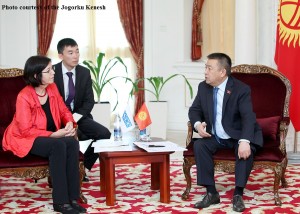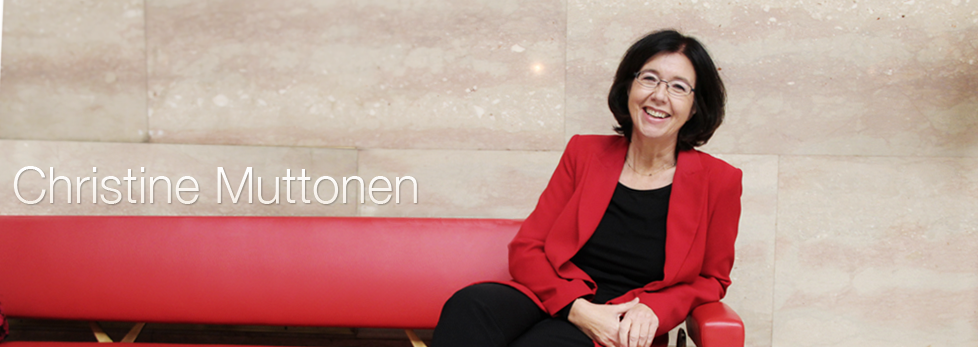OSCE Parliamentary Assembly Special Representative holds high-level meetings in Kyrgyzstan, delivers speech at OSCE Academy on conflict prevention
 BISHKEK, 3 June 2016 – Wrapping up a two-day visit to Kyrgyzstan, which has included meetings with the Speaker of the Parliament, the Minister of Foreign Affairs, and officials at the OSCE Centre in Bishkek, Special Representative for Central and Eastern Asia and Vice-President of the OSCE Parliamentary Assembly Christine Muttonen spoke to students today at the OSCE Academy in Bishkek on conflict prevention and peace-building, noting the strengths of the OSCE’s approach, as well as areas for improvement.
BISHKEK, 3 June 2016 – Wrapping up a two-day visit to Kyrgyzstan, which has included meetings with the Speaker of the Parliament, the Minister of Foreign Affairs, and officials at the OSCE Centre in Bishkek, Special Representative for Central and Eastern Asia and Vice-President of the OSCE Parliamentary Assembly Christine Muttonen spoke to students today at the OSCE Academy in Bishkek on conflict prevention and peace-building, noting the strengths of the OSCE’s approach, as well as areas for improvement.
Muttonen’s visit this week – her first to Kyrgyzstan since her appointment as Special Representative in January – has served as an opportunity to discuss confidence-building in the region and developing co-operative approaches to common challenges such as energy security, water management and border co-operation. In her meetings with Speaker of Parliament Chynybay Tursunbekov and Minister of Foreign Affairs Erlan Abdyldaev, Muttonen noted the importance of continuing to build trust and dialogue through the OSCE.
“There is a need to develop ways of countering the lack of trust and promoting co-operation between countries in the region,” she said. “The OSCE is our common organization, an inclusive organization in which all of its members have an equal voice, and we need to work effectively together within this forum.”
Discussions in Bishkek also focused on promoting follow-up on OSCE/ODIHR election-related recommendations and on the importance that Kyrgyzstan attaches to the OSCE and its Parliamentary Assembly. Muttonen expressed appreciation for the fact that Kyrgyzstan intends to send a full delegation to the OSCE PA’s 25th Annual Session in Tbilisi, Georgia, next month.
In meetings with staff of the OSCE Centre in Bishkek, Muttonen was briefed on the situation in the country and heard about the Centre’s ongoing projects, notably in the spheres of early warning and conflict prevention, as well as youth-oriented and parliamentary development projects. There was also discussion on the possibility of holding future OSCE PA events in the country.
In her lecture at the OSCE Academy, she highlighted the early warning capabilities of the OSCE – including through its field operations such as the Centre in Bishkek – but regretted that sometimes political considerations hamper effective implementation of early warning mechanisms. Discussing the OSCE’s consensus-based decision-making procedure and the non-binding character of its decisions, Muttonen pointed out the OSCE is only as strong as its participating States allow it to be.
Nevertheless, she said, the OSCE’s response to the crisis in and around Ukraine has served as an example of its ability to engage in conflict prevention and peace-building. “The Ukraine conflict has shown that the OSCE is well-placed and equipped to engage in conflict prevention and support mediation and peace-building,” said the PA Vice-President. “Through its unanimous vote principle, the OSCE and its participating States can formulate strong political agreements, even if the process may be slow.”
She noted that OSCE parliamentarians have been active in supporting the Central Asian countries’ peace-building efforts, notably through fact-finding missions.
Muttonen’s speech at the OSCE Academy concluded a week-long visit to Central Asia, which included meetings with government officials, parliamentary leaders and representatives of civil society in Astana, Almaty, and Bishkek.
In her mandate as Special Representative, she is tasked, inter alia, with encouraging active participation in the PA by parliamentarians from Central Asia, as well as liaising with and supporting the work of the OSCE field operations in the region.
To watch a recent interview with the Special Representative, in which she discusses her priorities, please click here. Photos of her visit this week to Central Asia are on Flickr. Her full remarks to the OSCE Academy are available here.






